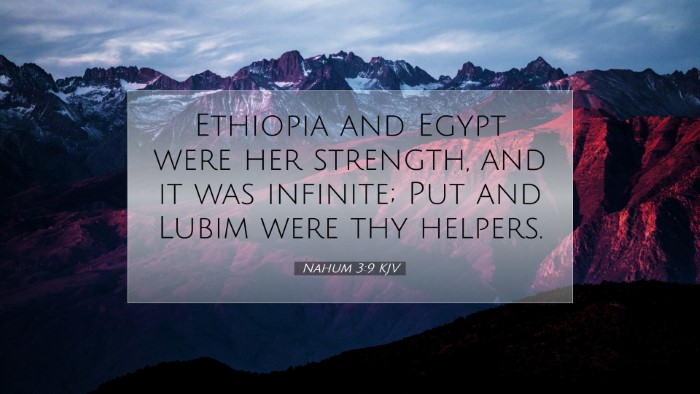Old Testament
Genesis Exodus Leviticus Numbers Deuteronomy Joshua Judges Ruth 1 Samuel 2 Samuel 1 Kings 2 Kings 1 Chronicles 2 Chronicles Ezra Nehemiah Esther Job Psalms Proverbs Ecclesiastes Song of Solomon Isaiah Jeremiah Lamentations Ezekiel Daniel Hosea Joel Amos Obadiah Jonah Micah Nahum Habakkuk Zephaniah Haggai Zechariah MalachiNahum 3:9
Nahum 3:9 KJV
Ethiopia and Egypt were her strength, and it was infinite; Put and Lubim were thy helpers.
Nahum 3:9 Bible Commentary
Nahum 3:9 Commentary
The verse Nahum 3:9 reads: "Ethiopia and Egypt were her strength, and it was infinite; Put and Lubim were thy helpers." This verse illustrates the military alliances and the geographical strengths that Nineveh had at its disposal, highlighting the confidence it placed in earthly powers rather than in God.
Contextual Background
The Book of Nahum is a prophecy concerning the city of Nineveh, the capital of Assyria, and serves as a declaration of its impending judgment and fall. Nahum’s prophecy is set against the backdrop of Assyria's widespread oppression and idolatry, which had evolved into a significant threat to Israel and the known world.
The Significance of Ethiopia and Egypt
- Ethiopia: Historically known for its formidable army and numerous resources, Ethiopia signifies the confidence that Nineveh took in its allies. Matthew Henry notes that the mention of Ethiopia indicates the power and military resources that Nineveh could call upon in times of crisis.
- Egypt: Egypt represents another strong ally. Known for its chariots and cavalry, its strength was sought after by many nations during ancient times. Albert Barnes emphasizes that Nineveh's reliance on Egypt, despite its power, ultimately led to its downfall, as no earthly alliance can withstand God's decree.
The Role of Put and Lubim
Put and Lubim are noted for their military strength and capacity, suggesting additional layers of support to Nineveh's power:
- Put: Often associated with regions in North Africa, Put contributed to Nineveh’s army. Adam Clarke states that Nineveh's reference to Put underlines its pursuit of external strength rather than spiritual dependence.
- Lubim: Likely referring to Libya, Lubim further adds to the array of nations that Nineveh relied upon. Their inclusion illustrates the extent of Nineveh's military network, which bore the illusion of security and strength.
Theological Implications
The significant theological implication from Nahum 3:9 revolves around the themes of reliance and judgment. Here we see that:
- Dependence on Human Strength: Nineveh’s trust in its military alliances signifies a profound lack of trust in God. As highlighted by Matthew Henry, this serves as a reminder that ultimate reliance on human strength leads to spiritual destitution.
- God's Sovereignty: Despite the apparent strength derived from these alliances, the prophecy indicates that God’s will prevails. The impending ruin of Nineveh illustrates the futility of opposing divine judgment through human means (Albert Barnes).
Application for Today
The messages from Nahum 3:9 remain relevant for contemporary believers. Here are insights to consider:
- True Security: Just as Nineveh put confidence in external powers, modern believers should examine where they place their trust. Are we relying on wealth, status, or external influences instead of on God?
- Divine Judgment: The text reflects the certainty of divine justice. Contemporary followers of Christ should be reminded that God sees all deeds, and there will be consequences for collective wrongdoing, especially at a national or corporate level.
- Holiness and Repentance: In light of Nahum’s prophecy, it is crucial for believers to pursue holiness and recognize the importance of individual and corporate repentance as a means to align oneself with God’s will.
Conclusion
Nahum 3:9 serves as a profound reminder not only of Nineveh’s impending doom but also of the futility of placing hope in anything other than God. As believers reflect on the lessons from Assyria’s missteps, let them redirect their faith and hope toward God’s eternal promises and sovereignty. In this verse, we confront a timeless truth: human strength is fleeting, but God’s power is everlasting.


